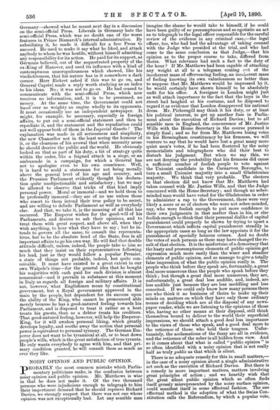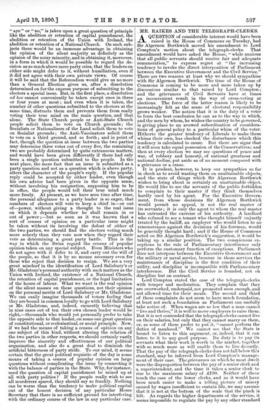NOISY OPINION AND PUBLIC OPINION.
PROBABLY the most common mistake which Paxlia- mentary politicians make, is the confusion between noisy opinion and public opinion. Mr. Matthews is wise in that he does not make it. Of the two thousand persons who were injudicious enough to telegraph to him their impertinent demand that he should reprieve Richard Davies, we strongly suspect that there was not one whose opinion was not exceptionally bad. Let any sensible man imagine the shame he would take to himself, if he could have been guilty of so presumptuous and so egotistic an act as to telegraph to the legal officer responsible for the careful review of the evidence in any criminal case,—the legal officer, too, who had had the advantage of taking counsel with the Judge who presided at the trial, and who had come to the same conclusion as that Judge,—that his opinion as to the proper course to take, differed from theirs. What relevance had such a fact to the duty of the hour ? If Mr. Matthews had been capable of attaching any weight at all to a telegram coming out of the incoherent mass of effervescing feeling, an incoherent mass of feeling knowing its own valuelessness no better than to suppose that Mr. Matthews would be impressed by it, he would certainly have shown himself to be absolutely unfit for his office. A foreigner in London might just as well attach importance to the fact that the boys in the street had laughed at his costume, and be disposed to regard it as evidence that London disapproved his national dress. Mr. Pickersgill may think it his duty, or at least his political interest, to get up another fuss in Parlia- ment about the execution of Richard Davies ; but to all sensible men in England, the concurrence of Mr. Justice Wills with the Home Secretary in the course pursued is simply final ; and so far from Mr. Matthews losing votes in his Birmingham constituency by his firmness, we will venture to say that he would have lost a great many more quiet men's votes, if he had been flustered by the noisy memorialists and telegraphers who did their best to disturb his judgment. But when we say this, we are not denying the probabilit7 that his firmness did cause a sufficient number of foolish people to vote against the Unionist candidate in the Carnarvon Boroughs, to turn a small Unionist majority into a small Gladstonian majority. We think that very probable. The electors in that election did not know that Mr. Matthews had taken counsel with Mr. Justice Wills, and. that the Judge concurred with the Home Secretary ; and though no sober- minded man would have voted for the Gladstonian in order to administer a rap to the Government, there were very likely a score or so of electors who were not sober-minded, nay, who were foolish enough to put more confidence in their own judgments in that matter than in his, or else foolish enough to think that their personal dislike of capital punishment could properly be shown by trying to upset a Government which inflicts capital punishment steadily in the appropriate cases so long as the law appoints it for the punishment of specially heinous crimes. And no doubt the votes of such persons as these may have changed the re- sult of that election. It is the misfortune of a democracy that the hasty and presumptuous elements of public opinion get expression much more easily than the wiser and steadier elements of public opinion, and so manage to give a totally false impression of what the public opinion really is. The people who think before they speak are, fortunately, a great deal more numerous than the people who speak before they think ; but though a great deal more numerous, they are, unfortunately, a great deal less audible, and, indeed, are less audible just because they are less meddling and less conceited. If we could only know how many persons there are who think it no business of theirs to make up their minds on matters on which they have only those ordinary means of deciding which are at the disposal of any news- paper reader, while we are listening to the opinions of those who, having no other means at their disposal, still think themselves bound to deliver to the world their superficial impressions, we should attach a good. deal less importance to the views of those who speak, and a good deal more to the reticence of those who hold their tongues. Unfor- tunately, the acclamations of the fussy are all in evidence, and the reticence of the sober is all hidden from view. And so it comes about that what is called "public opinion" is so often identified with a noisy opinion that is not really half as truly public as that which is silent.
There is no adequate remedy for this in small matters,— in the case of a noisy opinion about a single administrative act such as the execution of Richard Davies. But there is a remedy in more important matters, matters involving great principles of action ; and we heartily wish that the great silent public opinion which so often finds itself grossly misrepresented by the noisy surface opinion, could manifest itself in some effectual fashion. The one effectual method is the adoption of what the Swiss Con- stitution calls the Referendum, by which a popular vote, " aye " or "no." is taken upon a great question of principle like the abolition or retention of capital punishment, the abolition or retention of the Union with Ireland, the abolition or retention of a National Church. On such sub- jects there would be an immense advantage in obtaining the opinion of the silent majority as definitely as the opinion of the noisy minority, and in obtaining it, moreover, in a form in which it would be possible to regard the de- cision as so much above mere party cries, that the leaders on either side might defer to it, without humiliation, even if it did not agree with their own private views. Of course it will be said that the Referendum would give us no more than a General Election gives us, after a dissolution determined on for the express purpose of submitting to the electors a special issue. But, in the first place, a dissolution ad hoc cannot conveniently be taken except once in three or four years at most ; and even when it is taken, the number of other questions submitted to the electors at the same time, distracts them and prevents them from really voting their true mind on the main question, and that alone. The State Church people or Anti-State Church people solicit them to vote on Church grounds ; the Socialists or Nationalisers of the Land solicit them to vote on Socialist grounds ; the Anti-Vaccinators solicit them to vote on a third ground, and so forth ; and in point of fact, though the question at issue between the two parties may determine three votes out of every five, the remaining two are probably determined by quite extraneous matters, and would have been given differently if there had only been a single question submitted to the people. In the next place, the mere fact that an issue is submitted as a party question and not as a question which is above party, alters the character of the people's reply. If the popular reply could be accepted by either leader, even though his own advice had been given in the opposite sense, without involving his resignation, supposing him to be in office, the people would tell their true mind, much more freely. At present, as we have seen time after time, the personal allegiance to a party leader is so eager, that numbers of electors will vote to keep a chief in—or out of—power, without giving a thought to the real issue on which it depends whether he shall remain in or out of power ;—but so soon as it was known that a sort of census of opinion on a particular issue might be taken without its involving the defeat of either of the two parties, we should find the electors voting much more soberly than they vote now when they regard their vote as determining a great party battle. This is the way in which the Swiss regard the census of popular opinion taken on any special subject. Even Ministers who do not agree with it defer to it, and carry out the will of the people, so that it is by no means necessary even for those who reject that decision to resign. We see a very great mischief in the identification of Lord Salisbury's or Mr. Gladstone's personal authority with such matters as the Union with Ireland, the existence of a National Church, the retention of capital punishment, or the legal limitation of the hours of labour. What we want is the real opinion of the silent masses on these questions, not their opinion on the personal merits of Lord Salisbury or Mr. Gladstone. We can easily imagine thousands of voters feeling that they are bound in common loyalty to go with Lord Salisbury or Mr. Gladstone, and, indeed, earnestly believing that in nine cases out of ten their own chosen leader would, be right,—thousands who would yet personally prefer to take the opposite side to that leader, on some one great question of constitutional, or ecclesiastical, or social principle. Now, if we had the means of taking a census of opinion on any one subject of this kind, without altering the relation of the two parties in other respects, we should certainly vastly improve the sincerity and effectiveness of our political organisation, and also do a great deal to diminish the artificial bitterness of party strife. To our mind, it seems certain that the great political requisite of the day is some means of taking a census of popular opinion on large questions without complicating the issue by connecting it with the balance of parties in the State. Why, for instance, need the question of capital punishment be mixed up at all with party politics ? If the people really wish to see all murderers spared, they should say so frankly. Nothing can be worse than the tendency to make political capital out of the honest decision of any particular Home Secretary that there is no sufficient ground for interfering with the ordinary course of the law in any particular case.



















































 Previous page
Previous page